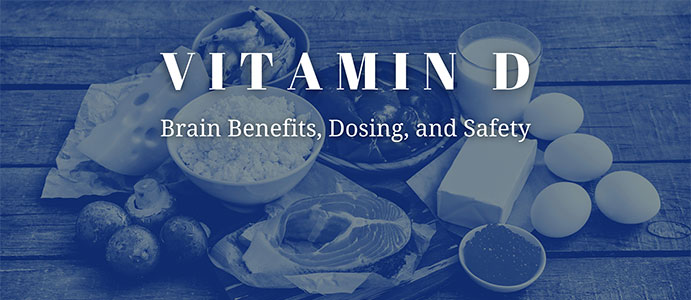
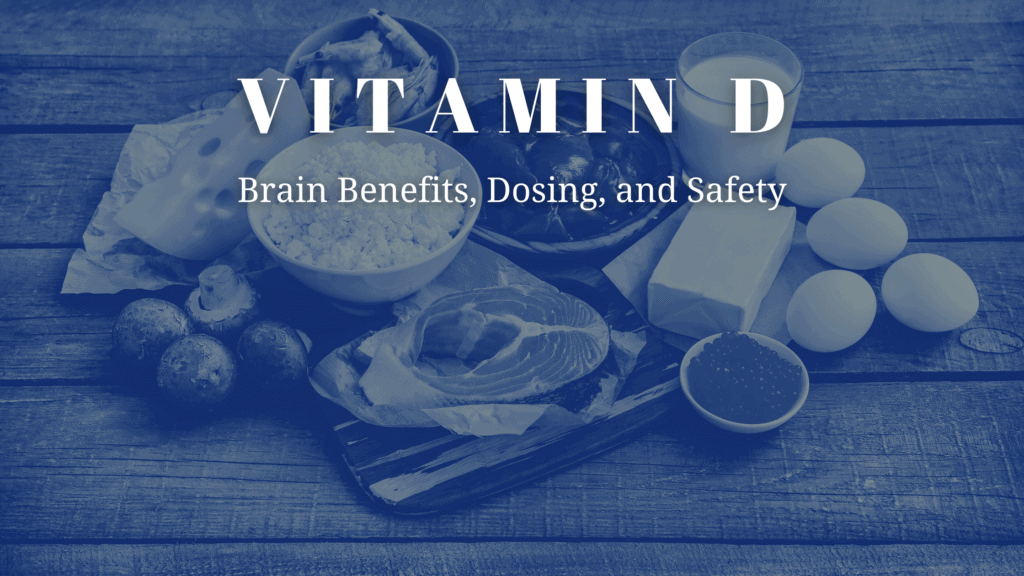
While initially touted as a vitamin for bone health, over the past few decades, research has uncovered that vitamin D is an essential vitamin for overall brain health. Around the world, vitamin D deficiency is the most common nutrient deficiency, with approximately 1 billion people showing low levels.[1]Palacios, C., & Gonzalez, L. (2014). Is vitamin D deficiency a major global public health problem?. The Journal of steroid biochemistry and molecular biology, 144 Pt A, 138–145.
>> Looking to Buy Vitamin D3? Click here to see our recommended sellers.
What is Vitamin D?
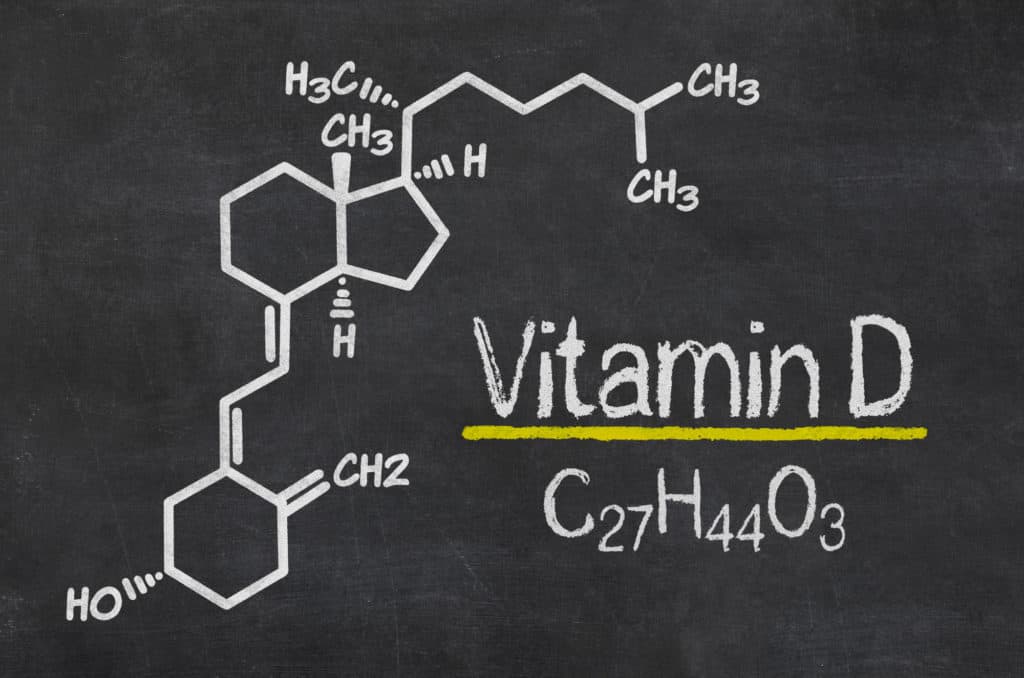
Vitamin D is considered to be a pro-hormone due to its steroid-like effects. It is found in two forms:
- Vitamin D3: Vitamin D3, or cholecalciferol, is produced in the skin when exposed to UV-B light. It is also found in animal-based sources such as fatty fish.
- Vitamin D2: Vitamin D2, or ergocalciferol, comes from plant sources. This includes mushrooms exposed to UV light and fortified milk.
Both of these forms are biologically inactive and must be converted into a bioactive form. First, vitamin D is hydroxylated in the liver into 25-hydroxyvitamin D. This is the circulating form of vitamin D that indicates vitamin D levels in the blood.
25-hydroxyvitamin D is further hydroxylated into calcitriol, or 1,25-dihydroxy vitamin D, in the kidneys. This is the bioactive form of vitamin D. Through its action on intracellular Vitamin D Receptors (VDRs), calcitriol regulates anywhere from 0.5 to 5% of the human genome.[2]Paffoni, A., Somigliana, E., Sarais, V., Ferrari, S., Reschini, M., Makieva, S., Papaleo, E., & Viganò, P. (2019). Effect of vitamin D supplementation on assisted reproduction technology (ART) outcomes and underlying biological mechanisms: protocol of a randomized clinical controlled trial. The “supplementation of vitamin D and reproductive outcome” (SUNDRO) study. BMC pregnancy and childbirth, 19(1), 395.
While vitamin D2 and vitamin D3 are found in supplement form, D3 is more effective at raising 25-hydroxyvitamin D levels.[3]Tripkovic, L., Lambert, H., Hart, K., Smith, C. P., Bucca, G., Penson, S., Chope, G., Hyppönen, E., Berry, J., Vieth, R., & Lanham-New, S. (2012). Comparison of vitamin D2 and vitamin D3 supplementation in raising serum 25-hydroxyvitamin D status: a systematic review and meta-analysis. The American journal of clinical nutrition, 95(6), 1357–1364.
The Health Benefits of Vitamin D
Vitamin D Supports Brain Health
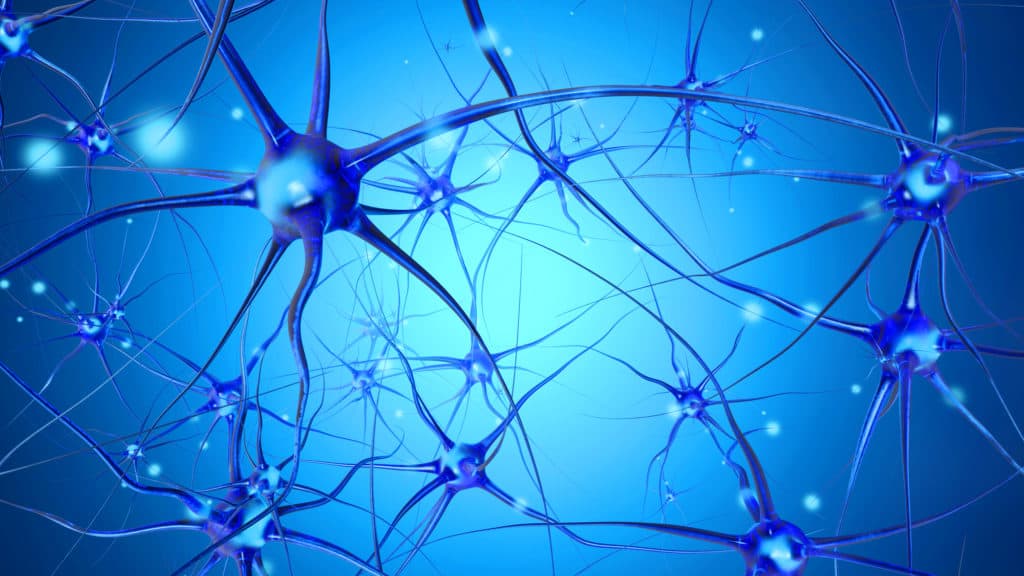
Vitamin D is a neuro-steroid that plays a vital role in maintaining brain health. It binds to VDR receptors throughout the nervous system and regulates genes that are involved in neurotransmitter synthesis, nerve growth, and inflammatory responses.
Specifically, vitamin D has been shown to:
- Activate genes that control the release of neurotransmitters such as dopamine and serotonin. These neurotransmitters are heavily involved in mood disorders and cognition.[4]Anjum, I., Jaffery, S. S., Fayyaz, M., Samoo, Z., & Anjum, S. (2018). The Role of Vitamin D in Brain Health: A Mini Literature Review. Cureus, 10(7), e2960.
- Regulate the release of nerve growth factor (NGF). NGF plays an essential role in the growth and maintenance of neurons.[5]Neveu I, Naveilhan P, Jehan F, et al. 1,25-dihydroxyvitamin D3 regulates the synthesis of nerve growth factor in primary cultures of glial cells. Brain Res Mol Brain Res. 1994;24(1-4):70-76.
- Act as a potent antioxidant. Vitamin D inhibits the generation of free radicals which can cause toxic oxidative stress to neurons.[6]Mokhtari, Zeinab & Hekmatdoost, Azita & Nourian, Mojgan. (2017). Antioxidant efficacy of vitamin D Open Access. Journal of Parathyroid Disease. 5. 11-16.
Vitamin D is also essential for healthy early brain development. Low levels have been correlated to various neurological and psychiatric diseases, including schizophrenia and autism.[7]Freedman R, Hunter SK, Hoffman MC. Prenatal Primary Prevention of Mental Illness by Micronutrient Supplements in Pregnancy. Am J Psychiatry. 2018;175(7):607-619.
Vitamin D May Improve Mood
Low levels of vitamin D have been associated with depressive symptoms.[8]Anglin, R., Samaan, Z., Walter, S., & McDonald, S. (2013). Vitamin D deficiency and depression in adults: Systematic review and meta-analysis. British Journal of Psychiatry, 202(2), 100-107.[9]Parker, G. B., Brotchie, H., & Graham, R. K. (2017). Vitamin D and depression. Journal of Affective Disorders, 208, 56–61. Low mood due to Seasonal Affective Disorder (SAD), which occurs during the winter months, is particularly correlated with low levels of vitamin D. Vitamin D supplementation is the most beneficial for those who have clinical depression and low vitamin D levels, to begin with.[10]Shipowick CD, Moore CB, Corbett C, Bindler R. Vitamin D and depressive symptoms in women during the winter: a pilot study. Appl Nurs Res. 2009;22(3):221-225.[11]Shaffer, J. A., Edmondson, D., Wasson, L. T., Falzon, L., Homma, K., Ezeokoli, N., Li, P., & Davidson, K. W. (2014). Vitamin D supplementation for depressive symptoms: a systematic review and meta-analysis of randomized controlled trials. Psychosomatic medicine, 76(3), 190–196.
In a study of 54 depressed adolescents, 4000IU of vitamin D3 for one month and 2000IU for two months raised vitamin D levels from 41 to 91 nmol/L. This was correlated with increased well-being and reduced depressive symptoms.[12]Högberg, G., Gustafsson, S. A., Hällström, T., Gustafsson, T., Klawitter, B., & Petersson, M. (2012). Depressed adolescents in a case-series were low in vitamin D and depression was ameliorated by vitamin D supplementation. Acta Paediatrica, 101(7), 779–783. A more recent study found vitamin D to be a useful adjunct to traditional antidepressants such as Prozac.[13]Khoraminya N, Tehrani-Doost M, Jazayeri S, Hosseini A, Djazayery A. Therapeutic effects of vitamin D as adjunctive therapy to fluoxetine in patients with major depressive disorder. Aust N Z J Psychiatry. 2013;47(3):271-275.
Vitamin D May Protect Against Neurodegenerative Diseases

Through its neuroprotective and anti-inflammatory properties, vitamin D may reduce the risk of developing neurodegenerative disorders such as Alzheimer’s and Parkinson’s disease. One study found that higher blood levels of vitamin D were correlated with a decreased risk of developing Parkinson’s disease. Individuals that had vitamin D levels of at least 50 nmol/L showed a 65% lower risk than those with values under 25 nmol/L.[15]Knekt, P., Kilkkinen, A., Rissanen, H., Marniemi, J., Sääksjärvi, K., & Heliövaara, M. (2010). Serum vitamin D and the risk of Parkinson disease. Archives of neurology, 67(7), 808–811. Some scientists speculate that chronically low levels of vitamin D lead to the loss of dopaminergic neurons in the substantia nigra, a region of the brain that is targeted in Parkinson’s disease.[16]Newmark HL, Newmark J. Vitamin D and Parkinson’s disease–a hypothesis. Mov Disord. 2007;22(4):461-468.
Alzheimer’s disease patients commonly have lower levels of serum vitamin D relative to age-matched healthy controls. According to one 2015 meta-analysis, vitamin D deficient individuals (<50nmol/L) are 21% more likely to develop Alzheimer’s disease compared to those who have serum vitamin D levels greater than 50 nmol/L.[17]Shen, L., Ji, H. Vitamin D deficiency is associated with increased risk of Alzheimer’s disease and dementia: evidence from meta-analysis. Nutr J 14, 76 (2015). Vitamin D may help clear amyloid plaques from the brain by stimulating the immune system. Amyloid plaques are clumps of neurotoxic proteins that build up between neurons and are implicated in the pathogenesis of Alzheimer’s disease.[18]Mathew T. Mizwicki, Danusa Menegaz, Jun Zhang, Antonio Barrientos-Durán, Stephen Tse, John R. Cashman, Patrick R. Griffin, Milan Fiala. Genomic and Nongenomic Signaling Induced by 1α,25(OH)2-Vitamin D3 Promotes the Recovery of Amyloid-β Phagocytosis by Alzheimer’s Disease Macrophages. Journal of Alzheimer’s Disease, 2012: Pages 51-62.
Vitamin D Dosing

Our bodies require UV-B light from the sun to produce vitamin D, which can be difficult depending on factors such as latitude, diet, skin pigmentation, and lifestyle. For this reason, supplementation can be a simple and effective way to raise levels.
Clinical trials with vitamin D have safely used daily doses anywhere from 400IU to over 10,000IU per day. According to the Institute of Medicine, a safe upper limit of vitamin D is 2000-4000IU per day for adults and 1000-3000IU per day for children.
Blood levels under 30 ng/mL are considered a deficiency, while levels between 30 ng/mL and 60 ng/mL are associated with the most optimal health outcomes.[19]Holick, Michael. (2007). Vitamin D Deficiency. The New England Journal of Medicine. 357. 266-81. 10.1056/NEJMra070553. Testing blood levels of 25(OH)D and trending these values over time alongside supplementation can ensure you’re staying within an optimal range.
Vitamin D Safety
Vitamin D is well-tolerated and safe, but potentially toxic at doses exceeding 40,000IU per day.[20]Vieth R. Vitamin D supplementation, 25-hydroxyvitamin D concentrations, and safety. Am J Clin Nutr. 1999;69(5):842-856. High levels can lead to the buildup of calcium in the blood, which can result in poor appetite, nausea, vomiting, and kidney problems. Consult with a medical professional before supplementing vitamin D if you suffer from any kidney condition.
Buy Vitamin D3 Online Review Comparison Table
| Product | Company | Quantity | Price | Country | Website |
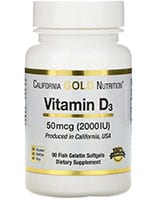 Vitamin D3 | iHerb | 90 pills (2000 IU) | AU$6.22 |  Worldwide, AU | Visit Website >> |
Originally posted on July 25, 2020, last updated on March 11, 2023.
References
| ↑1 | Palacios, C., & Gonzalez, L. (2014). Is vitamin D deficiency a major global public health problem?. The Journal of steroid biochemistry and molecular biology, 144 Pt A, 138–145. |
|---|---|
| ↑2 | Paffoni, A., Somigliana, E., Sarais, V., Ferrari, S., Reschini, M., Makieva, S., Papaleo, E., & Viganò, P. (2019). Effect of vitamin D supplementation on assisted reproduction technology (ART) outcomes and underlying biological mechanisms: protocol of a randomized clinical controlled trial. The “supplementation of vitamin D and reproductive outcome” (SUNDRO) study. BMC pregnancy and childbirth, 19(1), 395. |
| ↑3 | Tripkovic, L., Lambert, H., Hart, K., Smith, C. P., Bucca, G., Penson, S., Chope, G., Hyppönen, E., Berry, J., Vieth, R., & Lanham-New, S. (2012). Comparison of vitamin D2 and vitamin D3 supplementation in raising serum 25-hydroxyvitamin D status: a systematic review and meta-analysis. The American journal of clinical nutrition, 95(6), 1357–1364. |
| ↑4 | Anjum, I., Jaffery, S. S., Fayyaz, M., Samoo, Z., & Anjum, S. (2018). The Role of Vitamin D in Brain Health: A Mini Literature Review. Cureus, 10(7), e2960. |
| ↑5 | Neveu I, Naveilhan P, Jehan F, et al. 1,25-dihydroxyvitamin D3 regulates the synthesis of nerve growth factor in primary cultures of glial cells. Brain Res Mol Brain Res. 1994;24(1-4):70-76. |
| ↑6 | Mokhtari, Zeinab & Hekmatdoost, Azita & Nourian, Mojgan. (2017). Antioxidant efficacy of vitamin D Open Access. Journal of Parathyroid Disease. 5. 11-16. |
| ↑7 | Freedman R, Hunter SK, Hoffman MC. Prenatal Primary Prevention of Mental Illness by Micronutrient Supplements in Pregnancy. Am J Psychiatry. 2018;175(7):607-619. |
| ↑8 | Anglin, R., Samaan, Z., Walter, S., & McDonald, S. (2013). Vitamin D deficiency and depression in adults: Systematic review and meta-analysis. British Journal of Psychiatry, 202(2), 100-107. |
| ↑9 | Parker, G. B., Brotchie, H., & Graham, R. K. (2017). Vitamin D and depression. Journal of Affective Disorders, 208, 56–61. |
| ↑10 | Shipowick CD, Moore CB, Corbett C, Bindler R. Vitamin D and depressive symptoms in women during the winter: a pilot study. Appl Nurs Res. 2009;22(3):221-225. |
| ↑11 | Shaffer, J. A., Edmondson, D., Wasson, L. T., Falzon, L., Homma, K., Ezeokoli, N., Li, P., & Davidson, K. W. (2014). Vitamin D supplementation for depressive symptoms: a systematic review and meta-analysis of randomized controlled trials. Psychosomatic medicine, 76(3), 190–196. |
| ↑12 | Högberg, G., Gustafsson, S. A., Hällström, T., Gustafsson, T., Klawitter, B., & Petersson, M. (2012). Depressed adolescents in a case-series were low in vitamin D and depression was ameliorated by vitamin D supplementation. Acta Paediatrica, 101(7), 779–783. |
| ↑13 | Khoraminya N, Tehrani-Doost M, Jazayeri S, Hosseini A, Djazayery A. Therapeutic effects of vitamin D as adjunctive therapy to fluoxetine in patients with major depressive disorder. Aust N Z J Psychiatry. 2013;47(3):271-275. |
| ↑14 | Sommer I, Griebler U, Kien C, et al. Vitamin D deficiency as a risk factor for dementia: a systematic review and meta-analysis. BMC Geriatr. 2017;17(1):16. Published 2017 Jan 13. |
| ↑15 | Knekt, P., Kilkkinen, A., Rissanen, H., Marniemi, J., Sääksjärvi, K., & Heliövaara, M. (2010). Serum vitamin D and the risk of Parkinson disease. Archives of neurology, 67(7), 808–811. |
| ↑16 | Newmark HL, Newmark J. Vitamin D and Parkinson’s disease–a hypothesis. Mov Disord. 2007;22(4):461-468. |
| ↑17 | Shen, L., Ji, H. Vitamin D deficiency is associated with increased risk of Alzheimer’s disease and dementia: evidence from meta-analysis. Nutr J 14, 76 (2015). |
| ↑18 | Mathew T. Mizwicki, Danusa Menegaz, Jun Zhang, Antonio Barrientos-Durán, Stephen Tse, John R. Cashman, Patrick R. Griffin, Milan Fiala. Genomic and Nongenomic Signaling Induced by 1α,25(OH)2-Vitamin D3 Promotes the Recovery of Amyloid-β Phagocytosis by Alzheimer’s Disease Macrophages. Journal of Alzheimer’s Disease, 2012: Pages 51-62. |
| ↑19 | Holick, Michael. (2007). Vitamin D Deficiency. The New England Journal of Medicine. 357. 266-81. 10.1056/NEJMra070553. |
| ↑20 | Vieth R. Vitamin D supplementation, 25-hydroxyvitamin D concentrations, and safety. Am J Clin Nutr. 1999;69(5):842-856. |

Leave a Reply